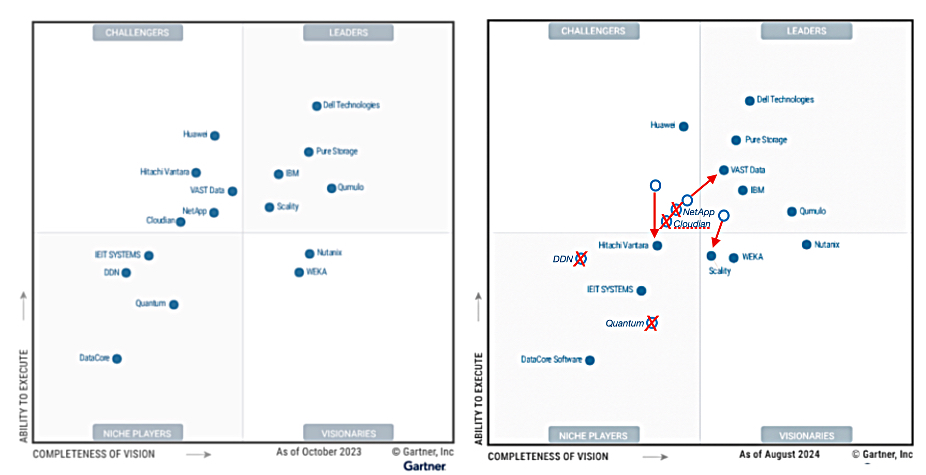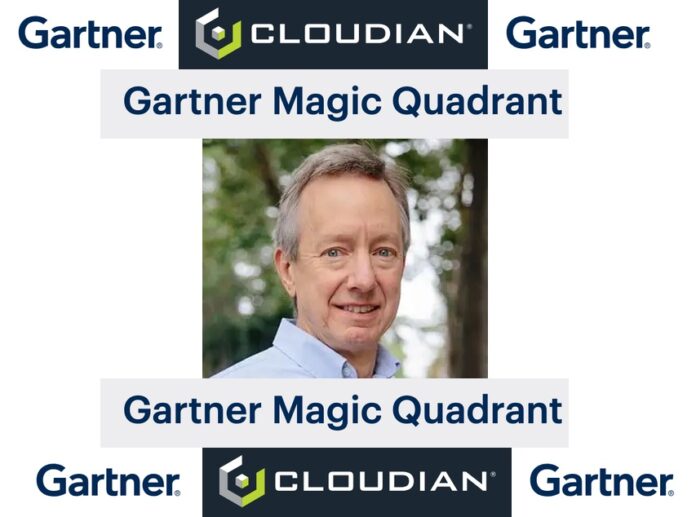Cloudian, DDN, NetApp and Quantum have been dropped from Gartner’s 2024 Magic Quadrant (MQ) for File and Object Storage Platforms, while VAST Data has moved from challenger to leader status.
The 2024 MQ report starts by stating “Market demand for a single platform supporting both file and object storage workloads has led to significant changes in the vendor landscape.” It’s not kidding. Excluding NetApp, Cloudian and the others while including vendors such as DataCore may arouse disbelief among many observers.
Dell has the top position in this MQ, rated as highest in a combined ability to execute and completeness of vision, followed by Pure Storage and then VAST Data. Scality has dropped from being a 2023 MQ leader to a visionary, and Hitachi Vantara changed from being a challenger to a niche player. A diagram showing the 2023 and 2024 MQs highlights the major changes.

Gartner appears to have changed its view of the market and hence its vendor inclusion criteria. The 2024 MQ’s market overview says: “The market for unstructured data has been slowly converging from separate file and object products to a single platform that can support all unstructured data workloads. In 2024, there are more vendors supporting a single platform as opposed to separate products. The shift from product to platform is more than supporting all unstructured data workloads. It is also about integrated capabilities to provide cyber resilience, global namespace and file systems and storage as a service.”
The 2024 MQ says that the missing vendors – Cloudian, DDN, NetApp and Quantum – were “dropped for not meeting the 2024 inclusion criteria of a single platform for file and object workloads.”

Jon Toor, Cloudian CMO, disagrees with this. He told us: “It is important to note that in the upcoming report, Gartner will claim that Cloudian did not meet the inclusion criteria. This claim is questionable on its face. Regardless, while the criteria for 2024 were indeed changed from previous years, we had already informed Gartner of our decision to opt out before the MQ process even began.”
He said: “In early 2024, Cloudian made a strategic decision to opt out of the upcoming Gartner Magic Quadrant (MQ) for File and Object Storage.”
“Our rationale to opt out was clear: the Gartner MQ increasingly diverges from the needs and priorities of our customers. Over recent years, this MQ has progressively emphasized file storage features while marginalizing the unique strengths of object storage, which remain core to Cloudian’s offering.”
“This emphasis on file capabilities does not resonate with Cloudian’s customer base, most of whom focus on the S3 API object storage capabilities that Cloudian offers. To them, evaluating a solution based primarily on its file-centric features is akin to choosing between a Porsche and a Ferrari based on who manufactures the better wristwatch—it’s simply irrelevant.”
Toor added: “The most recent 2023 MQ made Gartner’s bias towards file systems especially clear. Vendors specializing in object storage were systematically downgraded compared to their 2022 positions, while those focusing on file storage either improved or retained their placements.”
“This year,” he added, Gartner has removed the word ‘Distributed’ from the report’s title. “The former ‘Distributed File Systems and Object Storage’ report is now labeled simply ‘File and Object Storage Platforms.’ This shift reflects a movement towards traditional file solutions and away from the highly scalable, distributed architectures that are foundational to object storage.”

Scality CMO Paul Speciale said: “The wide-ranging changes to the inclusion criteria of this year’s Gartner’s Magic Quadrant for File and Object Storage Platforms show a heavy emphasis on vendor products being measured on their file — not object storage — offerings. Many object storage vendors that were previously included, based on the criteria of previous reports, are completely absent in this edition of the report.”
Jerome Lecat, Scality’s CEO, said: “While combining file and object in the same report may have been relevant in the past, it is not relevant anymore, since the object storage market has matured, and because the Magic Quadrant report only compares one specific product per vendor. For example, we have never seen PowerScale from Dell EMC or Vast Data deployed at scale for object storage needs.”
He added: “We believe Scality’s inclusion in the 2024 Magic Quadrant for File and Object Storage Platforms underscores our vision to deliver the most reliable and performant object storage solutions for AI and cyber resilience. Looking beyond 2024, we’re pioneering technologies that meet the massive data demands of the world’s most critical industries — from space exploration and genomic research to the stringent cybersecurity requirements of the financial industry and the high-performance standards of cloud service providers.”
Toor believes there should be a specific object storage MQ, saying: “We would always welcome the opportunity to work with the Gartner analysts in a comparison that evaluates object storage on its true merits — without conflating it with other technologies like NAS. If Gartner can provide a fair, relevant comparison — one that values Ferrari for being a Ferrari rather than for its ability to tell time — we would be more than willing to engage.”
We have asked DDN, NetApp and Quantum for comment. Check out the MQ courtesy of VAST Data here.








